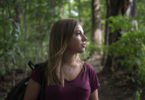What is beauty? What is perfection? In Kala’s words, “I am beautiful because of my imperfections.” This point of view didn’t always come easy. Kala has spent years struggling with Trichotillomania (TTM or ‘trich’), a repetitive hair-pulling disorder. She was 13 years old when she first began to pull her hair out. Her trich is part of a group of body focused repetitive behaviours (BFRB), which for Kala includes hair pulling, nail biting and skin biting and picking of her hands.
Kala made the decision to attend a peer-support group for BFRBs. The first step was difficult, “I thought they might think I was way too messed up for even a support meeting to help. Instead I ended up finding my second family.” Connecting with people who understand her struggles has been incredibly helpful. “I found a part of myself I didn’t know I had. Years later, I now lead the same group that helped me find my community, my self-worth and ultimately taught me there is life outside of a diagnosis. I have found purpose in adversity.”
What does resilience mean to you?
Resilience is strength. It is the ability to bend when the wind blows and to get back up when you fall down. Resilience to me, is knowing that I cannot do this alone and that it is all right to ask for help, and seek support and love from those around you.

“Resilience to me, is knowing that I cannot do this alone and that it is all right to ask for help,” says Kala.
What are dark days like for you and how do you find strength and resilience in these moments?
Dark days always culminate with self-hatred and shame for me. Days when I allow myself to wallow in self-pity and judgement. Days when I am left hating myself for doing this to myself, for not having the ability to stop the behaviour and for feeling like a failure, because in my moment of shame, I see only ONE way of being successful and “winning.” That involves thick healthy hair, beautiful nails and perfect skin. Perfection is often the top of a roller coaster ride to the bottom for me.
Sometimes the days are dark and I simply have to tell myself, “Tomorrow will be better,” and trudge on. I remind myself that I am not perfect. I am flawed and I am human. I am not my body-focused repetitive behaviour (BFRB), and I am beautiful because of my imperfections.
Strength is not equated with not ever allowing life to beat you down, in reality, strength comes from surviving the things life throws at you, getting up off the ground, dusting yourself off and going forward. Strength is crying when you need to cry or talking when you need to talk. I even have ‘Resilient’ and ‘Perfectly Imperfect’ tattooed on both of my forearms to remind myself to stop, remember my value, my strength, and to celebrate my imperfections.
What is in your “took-kit”? What are the things that help you find strength and resilience?
The number one thing I do to come to terms with my disorder is to TALK ABOUT IT. Talk about it with people I trust, those I know who love me for every quirk I have. I reach out to my best friends, my mom, and my saving grace, my monthly BFRB peer support group. I started attending in April 2013 and it turned everything around for me.
Gaining self-acceptance of my disorder has never been easy, but I achieved it through my peer support group. Over the years I have gone from attendee to facilitator and I can honestly say that talking to others, helping them come to terms with their disorders and finding their place in the journey to self-acceptance, has become the biggest and most important thing in my life. It helps me feel like I am making a difference and that I am helping people who were in the same position as I was years ago.
I also take care of myself. Good sleep, good food and adequate exercise. I see a psychotherapist regularly and I practice mindfulness and Cognitive Behavioural Therapy techniques to help me move on from the intrusive and caustic thoughts that come on the dark days.
How do you feel about the future?
I feel hopeful. It has taken me a lot of hard work and introspection to come to terms with who I am with this disorder. Finding myself has paved the way for me to be able to look forward and see the road ahead more clearly. I am a leader, a survivor and I live my life every day with BFRBs.
You can be successful and happy, while still living with mental illness. I hope to continue making a difference in my BFRB community, spreading awareness and letting folks know that there is quality life beyond a mental health diagnosis.
If you need help in an emergency please call 911 or visit your local emergency department. If you’re feeling like you’re in crisis, or need somebody to talk to, please know that help is also available 24/7 through community resources:
- Phone: toll-free 1-833-456-4566
- Text: 45645
- Chat: crisisservicescanada.ca







